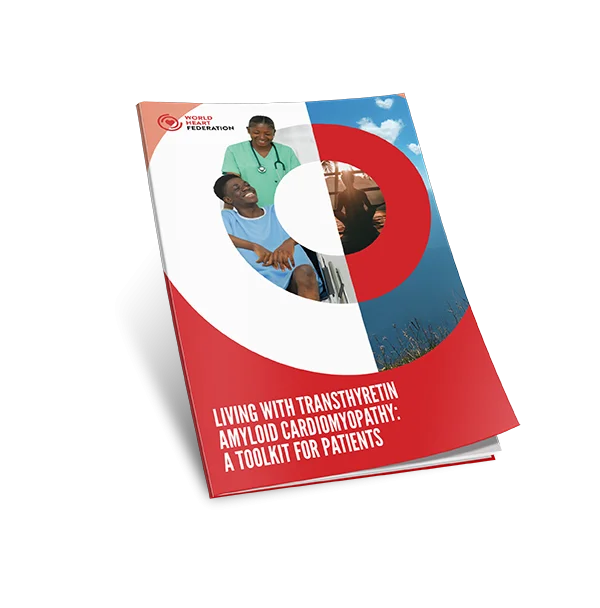A Patient Toolkit from the World Heart Federation
Transthyretin Amyloid Cardiomyopathy (ATTR-CM) is a serious, progressive condition that affects the heart’s ability to function. The World Heart Federation has created a practical toolkit designed for patients and caregivers to better understand and manage life with ATTR-CM.
This resource focuses on empowerment through lifestyle guidance, symptom tracking, and mental health support.
What is ATTR-CM?
ATTR-CM occurs when the transthyretin (TTR) protein changes shape and forms deposits—called amyloid—that build up in the heart and other organs. Over time, these deposits stiffen the heart muscle, reduce its ability to pump blood effectively, and may lead to heart failure.
There are two main types:
-
Wild-type ATTR-CM: Non-hereditary, often affecting men over 60.
-
Hereditary ATTR-CM: Inherited and may show symptoms earlier in life.
The ATTR-CM Toolkit
With the availability of therapies for ATTR-CM, the late-onset (wild type) Transthyretin Amyloidosis can no longer be considered a rare disease. Thus, there is an increasing need to support patients in their disease journey. WHF has developed a new toolkit designed for patients with ATTR-CM that builds on the main gaps in achieving optimal care for patients including disease impact; genetic implications; treatment options; and a new symptom monitor and tracker.
This practical tool helps you stay organized and in control. It includes:
-
Emergency contact and medication lists
-
Symptom and wellness trackers
-
Medication logs
-
Questions for doctor visits
-
A personal journal for reflections and mental well-being
Key Symptoms to Monitor
Because ATTR-CM symptoms resemble those of other conditions, it’s often misdiagnosed. Symptoms may vary, but common ones include:
-
Shortness of breath, especially during activity
-
Chest congestion and wheezing
-
Fatigue, even after rest
-
Irregular heartbeats
-
Swelling in legs or abdomen
-
Dizziness or fainting
If you or a loved one experience any of these, speak to a healthcare provider.
Living Better with ATTR-CM
While ATTR-CM currently has no cure, you can manage its progression through:
Diet and Nutrition
-
Eat low-sodium, heart-healthy meals
-
Focus on fruits, vegetables, lean proteins, and whole grains
-
Limit fats, sugar, and processed foods
-
Stay hydrated, but monitor fluid intake if swelling is a concern
Physical Activity
-
Engage in gentle movement like walking, swimming, or light household chores
-
Listen to your body and pace yourself—rest when needed
The Importance of Genetic Testing
If ATTR-CM is suspected, genetic testing can help determine whether it is hereditary. If confirmed, genetic counseling is essential for identifying at-risk family members.
Treatment Options
There are approved treatments that help slow disease progression by stabilizing TTR proteins. These include:
-
TTR Stabilizers: Tafamidis, Acoramidis
-
TTR Silencers (currently under research for ATTR-CM)
-
Supportive treatments like diuretics, anti-arrhythmics, and low-sodium diets
Always consult your healthcare provider before starting or changing any medication regimen.
Keeping Track of Your Health
Routine monitoring is vital. The toolkit includes logs and trackers to help you and your healthcare team stay informed about:
-
Blood pressure
-
Heart rate
-
Blood oxygen levels (SpO2)
-
Symptom progression
-
Medication adherence
Mental Health and Community Support
Living with a chronic heart condition can feel overwhelming. You’re not alone.
National and Regional Amyloidosis Organizations
-
International: amyloidosisalliance.org
-
Australia: aan.org.au/health-professionals/amyloidosis-types/attr
-
Belgium: amybel.be
-
Brazil: abpar.org.br
-
Canada: amyloidosiscanada.org
-
France: amylose.asso.fr
-
Germany: amyloidose-selbsthilfe.de
-
Netherlands: amyloidose.nl
-
Sweden: famynorrbotten.se
-
United Kingdom: amyloidosisuk.org
-
United States: amyloidosis.org, amyloidosissupport.org


